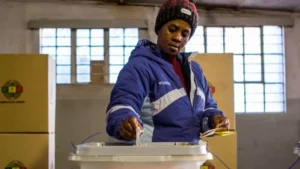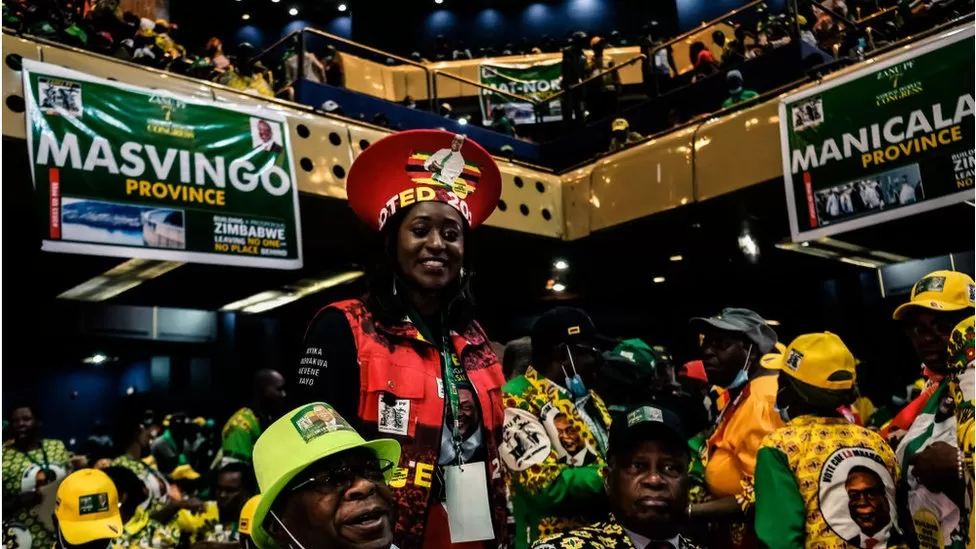Presidential and legislative elections are taking place on Wednesday in Zimbabwe. The incumbent President Emmerson Mnangagwa is trying to hold onto power, while the repressed opposition hopes to gain a protest vote.
Polling stations open on Wednesday, August 23 in Zimbabwe to elect the president and parliament, following a campaign marked by a blatant repression of the opposition and significant irregularities in the voter lists.
The opposition, historically strong in urban areas, hopes to gain a protest vote rooted in growing anger over a struggling economy, characterized by record unemployment and constant hyperinflation. “We are tired of living day by day, we don’t save a dollar,” whispers Paddington, 27, who sells oranges from the back of his rusty van on the outskirts of the capital Harare.

Can the incumbent President Emmerson Mnangagwa, 80, turn the situation around? The trader bursts into a nervous laugh. If he has placed a poster of the ruling Zanu-PF on his truck, it is to “have peace,” he says, alluding to the threats of retaliation against those who openly criticize the government. The Zanu-PF, in power since the landlocked southern African country gained independence in 1980, seems determined to hold onto power.
Its main rival, 45-year-old lawyer and pastor Nelson Chamisa, strained his voice during his last rally in Harare on Monday, in front of a crowd adorned in yellow, the color of his Coalition of Citizens for Change (CCC). “I have held 75 rallies” all over the country, shouted the slender man with a thin mustache and a golden shirt. “More than a hundred (others) have been banned, but God says it is time for me to be president.” “We will win this election,” and even “by a large margin,” he predicted, promising to replace “a ruler with a leader.”
According to government spokesperson Nick Mangwana, the election will be peaceful. In 2018, the army fired live ammunition at protesters contesting Mnangagwa’s election, killing six people. “The country is calm… Peace already reigns,” he declared on Tuesday to AFP. “I would simply like every Zimbabwean to accept the choice of the people,” he added, as if the game were already over.
Feared fraud
The president has tirelessly promised a fair election. But “the Zanu-PF is unstoppable. Victory is certain,” he said at his last rally on Saturday. “No one will prevent us from leading this country,” he affirmed earlier this month.
Zimbabweans have been plunged into an economic crisis for years, with no end in sight. “The roads are not good, the schools are not good, our economy is not good,” listed 37-year-old carpenter Tendai Kativhu to AFP.
But after a campaign marked by intimidation and arrests of opponents, in a country burdened by a long history of elections marred by irregularities, few believe that Nelson Chamisa, nicknamed “the young man” in contrast to the octogenarian president, will emerge victorious.
Human Rights Watch has predicted a “seriously flawed electoral process.” And significant irregularities have been observed in the voter lists, by both the opposition and civil society organizations, also raising concerns of electoral fraud during the vote count. These concerns are “the product of an overactive imagination,” said Rodney Kiwa, vice-president of the Electoral Commission (ZEC), to AFP. “We are ready. If there are problems, we will resolve them.”
The economy is at the heart of the concerns of the 6.6 million voters. Inflation was at 101% in July, according to official figures. According to Zimbabwean political analyst Brian Kagoro, if the campaign had not been so biased against the opposition, it was “the most winnable” election for them in 15 years.
Chamisa promises to build a new Zimbabwe “for all”: tackling corruption, reviving the economy. To improve his image, President Mnangagwa, nicknamed the “Crocodile” for his ruthless character, has cut numerous ribbons in recent weeks, inaugurating power plants and clinics.
The president is elected by an absolute majority. If no candidate wins 50% of the votes plus one, a second round is organized.
With AFP
